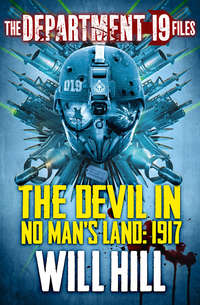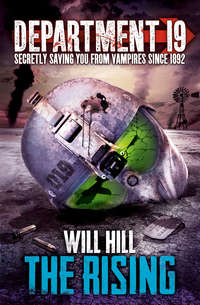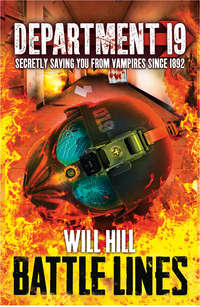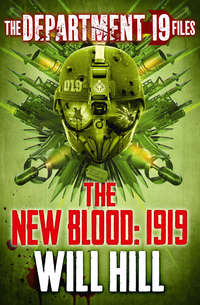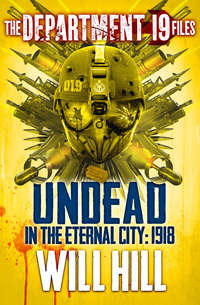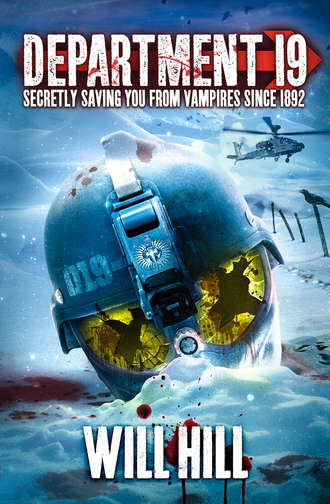
Полная версия
Department 19
Matt ran towards her. He didn’t know what he was going to do, just that he had to do something. He heard his father shout at him, but ignored him. The soldier who had hit the girl with his gun turned, saw him crossing the lawn, and started to move, a shout of warning issuing from his lips. But he wasn’t quick enough; Matt slid on to his knees beside the broken girl and looked at the woman in the biohazard suit.
“Can I hel—”
The girl’s arm flashed out and slid across his throat. Matt felt a millisecond of resistance as her fingernails dug into the smooth skin of his neck, then it was gone, and an enormous spray of something red burst into the night air, soaking his chin and his chest.
There was no pain; just surprise, and a suddenly overwhelming tiredness. Matt stared at the dark liquid squirting into the air, and only realised it was his own blood as he fell gently backwards on to the patchy grass of the lawn. It pattered thickly on to his upturned face, and as his eyes closed he felt hands pressing against his neck, and heard one of the soldiers telling his father that this had never happened.
Chapter 5
INTO THE DARKNESS
Jamie Carpenter dreamt of his father.
When he was ten his dad came home from work, holding his hand under his coat, and disappeared upstairs without saying hello to his son. Jamie’s mother was visiting her sister in Surrey, and after a moment he followed his father, treading on the balls of his feet, taking the steps one at a time, slowly.
Through the half-open bathroom door he saw his father standing with his right hand in the sink. There were spots of red on the mirror and the white porcelain.
Jamie crept across the landing. His father was running the hot tap over his hand, grimacing at the temperature. He turned the tap off and reached for a towel and Jamie saw his hand. There was a long bloody cut running from his wrist to his elbow, and in the middle of the gash something dark was sticking out, dirty brown against the red.
His father dabbed the blood away from the cut and slowly reached into the wound. He gritted his teeth, then pulled the dark object out of his arm, letting out a sharp grunt as it came free. Jamie stared. It looked like a fingernail, more than an inch long, sharp and curved like a talon. A chunk of ragged meat hung from the thick end of the nail, glistening white in the bright light of the bathroom.
He gasped. He hadn’t meant to. His father looked round sharply and Jamie stood rigid, speechless. His father opened his mouth as if to say something, then kicked the bathroom door shut, leaving Jamie standing on the dark landing.
Jamie drifted awake. He was moving, a loud car engine rumbling somewhere behind him, the sound of rain hammering against glass close to his head. He slowly opened his eyes and found himself looking out of a window at a dark forest, the trees blurring as they passed, water tumbling from the sky in sheets. He turned his head to the driver and cried out. Instinctively he reached for the passenger door handle and turned it, not caring what would happen if he jumped from a moving car, just knowing he had to get out, get away from the horror in the seat next to him.
“Don’t bother,” said the driver, his voice so loud that it drowned out the engine. “It’s locked.”
Jamie pressed himself against the door.
In the seat next to him was Frankenstein’s monster.
This is a dream. Isn’t it? It has to be, this can’t be real.
“It’s not polite to stare,” the monster said, and Jamie thought he heard the faintest hint of a laugh under the booming, granite voice.
“Who are you?” Jamie managed, his mind screaming warnings at him. Don’t talk to it! Are you stupid? Just shut up!
“My name is Victor Frankenstein. I did introduce myself. I assume you don’t remember?”
Jamie shook his head, and Frankenstein grunted.
“I suspected as much. Good thing I locked the doors.”
He laughed, a huge sound like a clap of thunder.
“There is only a certain amount I am permitted to tell you,” he continued. “I’m taking you to a safe place. My superior will tell you whatever else he decides you need to know.”
“Who is your superior?” asked Jamie.
No reply.
“I asked you a question,” he repeated, his voice rising. “Did you hear me?”
Frankenstein turned his enormous head and looked at Jamie.
“I heard you,” he said. “I chose not to answer.”
Jamie recoiled, and then the image of the blood on the bedroom windowsill crashed into his head, and he remembered.
“My mother,” he said, his eyes wide. “We have to go back for her.”
Frankenstein shot him a look of concern.
“We can’t go back,” he said. “She’s gone. You know that.”
Jamie fumbled his mobile phone out of his pocket, scrolled through his contacts until he found his mother’s number, keyed the green button and held it to his ear.
Nothing happened.
He pulled the phone away from his ear and looked at the glowing screen. The network logo that usually shone in the middle was gone, as was the bar that indicated the strength of his signal.
“Phones don’t work around here,” said Frankenstein.
Jamie grabbed again at the door handle, wrenching it until the plastic began to bend in his grip.
“Stop that!” roared Frankenstein. “You will be of no help to her if I have to scrape you off the tarmac!”
Jamie turned on the monster, his eyes blazing. “Stop the car!” he yelled. “Stop it right now! I have to help my mum!”
The car didn’t slow, but the huge man in the driver’s seat looked over at him.
“Your mother is gone,” he said, softly. “You may or may not believe me when I tell you I find that fact almost as distressing as you do. But the fact remains; she’s gone. And running around in the dark will not bring her back.”
Jamie stared angrily at the bolts in the huge man’s neck and, not for the first time, his mouth got the better of him.
“I thought Frankenstein was the creator, not the monster,” he muttered.
The brakes of the car squealed, the wheels locked and they slid to a halt. Frankenstein took a deep breath.
“Victor Frankenstein made me,” he said, his voice like ice. “And for a time I was a monster. But after Frankenstein died, I took his name. To honour him. Now, do you have any more impertinent questions, or should I get us to safety?”
Jamie nodded. “I’m sorry,” he said, quietly.
Frankenstein didn’t respond.
“I said I’m sorry.”
“I heard you,” grunted the monster. “I accept your apology, as I accept the fact that you’re worried about your mother, and worry can make people say unwise things. I need you to accept that I share your concern about Marie, and that I’m taking you to the only people in the country who may be able to bring her back to you. And most of all, I need you to shut up and let me drive.”
Jamie turned away, and watched the road they were travelling on snake through the quiet forest. The trees were thick on all sides, blurred by the pounding rain, and the headlights of the car illuminated little more than the road itself, a single lane of concrete that looked oddly well-maintained in this deep countryside.
Every few minutes he looked over at the man in the driver’s seat. Frankenstein’s eyes were glued to the road, and he didn’t so much as glance in Jamie’s direction.
Around the car, the woods seemed to be thickening. Jamie leant forward and craned his neck upwards. He could no longer see the night sky; the trees had arched over the road from both sides and fused into an impenetrable ceiling of wood and leaves.
This didn’t just happen. This is a tunnel. Someone made this.
The car rounded a sharp corner, and Jamie gasped.
In front of them was a huge dark green gate. It stretched across the width of the road and disappeared into the canopy above them, leaving no edges in sight. In the middle of the gate hung a large white sign, illuminated by a strip light above it. Rain lashed against the bulb, sending running shadows across the sign, on which four lines of bright red text had been printed.
MINISTRY OF DEFENCETHIS IS A RESTRICTED AREAUNDER THE PROVISIONS OF THE OFFICIAL SECRETSACT NO TRESPASSING
Smoothly, and utterly silently, the enormous gate slid open. Beyond it was absolute darkness. There was a pause, then an artificial voice sounded through the rain.
“This is a restricted area. Please move your vehicle into authorisation.”
Frankenstein eased the car forward, and for a brief moment panic gripped Jamie.
Don’t go in there. Take me home. I want to go home.
The gate slid shut behind the car, cutting off the faint light from the woods.
“Place your vehicle in neutral,” the voice ordered, and Frankenstein did so.
Machinery whirred into life underneath their car and they began to move. They stopped after an unknowable distance, and then the car was enveloped by a pressurised cloud of white gas that billowed from beneath them, the noise of its release deafening in the enclosed space.
Jamie instinctively reached out and grabbed Frankenstein’s arm.
“What’s that?” he cried.
“It’s a spectroscope,” Frankenstein replied. “It detects the vapours released by explosives. It’s making sure we aren’t booby-trapped.”
He gently lifted Jamie’s hand from the sleeve of his coat and placed it back in the boy’s lap. The artificial voice spoke again.
“Please state the names and designations of all passengers.”
Frankenstein rolled down the driver’s window and spoke loudly and clearly into the darkness.
“Frankenstein, Victor. NS302-45D. Carpenter, Jamie. No designation.”
Two halogen spotlights exploded into life, enveloping the car in a circle of blinding white light.
“Non-designated personnel are not permitted access to this facility,” the artificial voice said.
This time Frankenstein roared through the window.
“Non-designated personnel present on the authority of Seward, Henry, NS303-27A.”
There was a long, pregnant pause.
“Clearance granted,” the voice said. “Proceed.”
The spotlights disappeared, replaced with warm electric light, and Jamie’s eyes widened in amazement. They were in a tunnel at least fifty metres long and ten metres wide. Covering most of the floor was a dark grey treadmill, in the middle of which sat their car. Two white concrete paths ran the length of the tunnel, on either side. The walls were immaculate white, stretching up to a ceiling that had to be at least six metres high. Where the walls and ceilings met, lights of numerous shapes and sizes pointed down at the treadmill. Jamie could see the wide circles of spotlights, and rows of thick rectangular boxes with purple lenses.
Frankenstein breathed out heavily, filling the car with warm air, and drove forward, along the treadmill. As they neared the end of the tunnel, another gate, as silent as the first, slid open. They drove through the gate, and Jamie got his first look at a world very few people knew existed.
Light bathed the car, purple and yellow, creating an atmosphere that was both cold and warm. Ahead of the car, at the end of a strip of tarmac lit by lights that stood at five-metre intervals, a wide, low grey dome rose out of the ground, like the visible part of a ball buried in the earth. To the left of the car, and far to the right, a pair of enormous red and white radar dishes revolved slowly atop squat grey buildings. Beyond the dishes lay a long runway, lights flashing at intervals along its length, two huge beacons shining at one end. Sitting on this runway, partially hidden by the low dome, was a white airliner with a red stripe running the length of its fuselage. As Jamie watched, a steady stream of men and women, dressed in civilian clothes, appeared from behind the dome and walked up a ladder truck to the plane’s door. He could hear voices and laughter, carrying on the night air.
Frankenstein pressed the accelerator and the car moved slowly forward. As it did, Jamie craned his neck, looking for the tunnel they had emerged from. He saw it, a wide black semi-circle disappearing as the gate they had passed through slid back into place, but what lay to the sides of the tunnel caused him to gasp, audibly. A road, branching off the one they were slowly travelling along, curved back and ran parallel to the tunnel, the exterior of which was a flat, nondescript grey. Fifteen metres before the tunnel disappeared into the tree line it curved again, this time into a long, shallow arc that ran parallel to a huge metal fence. Jamie’s eyes widened.
“Wait,” he said. “Stop the car. I want to see.”
Frankenstein grunted, and shot him a look of annoyance, but he drew the car to a halt. Jamie threw open the door and stepped out. His head was spinning as he tried to take in what he was looking at.
The inner fence was at least fifteen metres high, made of thick metal mesh and topped with vicious snarls of razor wire. Set into the fence at one hundred metre intervals were guard towers, cubes of metal on top of sturdy-looking pylons. There were no lights in them, but Jamie’s eyes caught movement in the one nearest to him. He turned to look at the next tower, a hundred metres further away, and the next, and the next. The fence ran for as far as he could see, in what appeared to be a vast circle. It passed the end of the runway before it disappeared from view beyond a series of low rectangular buildings on the far side of the landing strip. He turned slowly, taking everything in.
Past the low buildings his view was obscured by the dome. Further to the right, a large building sat flush against the runway, its huge metal doors closed. Beyond it Jamie again picked up the path of the fence, the towers evenly distributed along its incredible length. He continued his turn, ignoring Frankenstein, who was looking at him with a certain amount of gentle bemusement. The road running along the inside of the fence continued until it met the tunnel again, then curved back to join the central road no more than twenty feet from where he was standing.
Beyond the inner fence was a wide strip of dirt, crisscrossed with hundreds of thousands of red laser beams; the complexity of the patterns would have made the world’s greatest jewel thief weep. This strip of no-man’s-land was bordered on the other side by a second fence, almost as high as the one by the road. Beyond it lay the woods, a wall of twisted branches and leaves, running a perfectly even distance from the outer fence. Every square inch of the space between them, a dirt run five metres wide, was illuminated by bright purple ultraviolet light, shining down from black boxes set at three-metre intervals along the outer fence.
Excitement surged through Jamie as his eyes drank in the sheer strangeness of what he was seeing.
What is this place? Why are there so many fences and lights and towers? What are they keeping out?
As his eyes adjusted to the brilliant red and purple illumination before him, he saw that set in between the flickering laser grid was a series of giant spotlights, the wide round lenses pointing into the sky. He looked up, and his mouth fell open.
“Oh my God,” he whispered.
There were no visible beams rising from the spotlights, but their purpose was clear as soon as he tilted back his head. Above him, shimmering gently in the night air, an enormous canopy of trees hung in the sky, extending seamlessly from the edges of the woods and covering the whole of whatever this place was. From underneath the image was flat, and faintly translucent, like a film of oil on a puddle of water, but he could see erratic shapes and uneven rises bristling the upper side. The effect was disorientating.
“What is it?” he asked, his voice full of wonder.
“It’s a hologram,” Frankenstein answered. “It keeps away prying eyes.”
He fought off the urge to ask who those eyes might belong to, and instead asked how it worked.
“There’s a suspended field of reflective particles that lies over the whole base. The spotlights project a moving image on to it from underneath.”
“Like a big cinema screen?”
Frankenstein laughed, a strange barking noise that did not sound as though it came naturally to him.
“Something like that,” he replied. “From above, all anyone sees is the forest. Have you seen enough?”
Jamie hadn’t, nowhere near enough, but he told his companion that he had, knowing it was what the giant man wanted to hear.
“Good,” Frankenstein said, not unkindly, and got back into the car. Jamie did the same, and they moved forward, towards the low grey dome.
In front of the building were several military vehicles, a heavy-looking truck with an open rear, a row of jeeps and a surprising number of civilian cars. Between one of the jeeps and a 3-series BMW that had seen better days, a parking bay was stencilled on the tarmac in white paint. Frankenstein guided their car into it and pulled it to a halt. The giant man and Jamie stepped out of the car and walked back around to a flat indentation where the dome faced the road they had just driven along. Set into the grey material of the building was a door. It stood open, waiting for them.
Frankenstein motioned for Jamie to enter, then followed him in when he did so. They were standing in a white corridor, featureless except for a sculpted crest that looked down at them from high on the wall opposite them.
“What now?” asked Jamie.
“We wait,” replied Frankenstein.
Jamie studied the crest as he did so. A crown and portcullis sat above a wide circle, in which had been carved six flaming torches encircling a plain crucifix. Beneath the circle three words of Latin were etched into the wall.
Lux E Tenebris
“What does that mean?” asked Jamie, pointing up at the crest.
“Light out of darkness,” translated Frankenstein. “It was the favourite phrase of a great man.”
“Who?”
The door closed behind them, sliding silently until it met the opposite wall, where it thudded into place with a loud clunk. There was a sound like spinning gears moving heavy machinery, then a quieter, yet somehow ominous second clunk. Instantly, the wall at the far end of the corridor slid aside to reveal a silver metal lift.
“Not now,” said Frankenstein, and walked down the corridor. After a moment’s hesitation, Jamie followed him.
The lift car had no buttons, and as soon as they stepped inside the door closed and they began to descend. It was such a familiar, mundane feeling, the shift in his stomach, the vibrations in his legs, that the mild hysteria Jamie realised he had been feeling ever since the thing in the grey coat had walked through the door of the house he shared with his mother threatened to pitch him into a fit of laughter. He steadied himself, and waited for the door to reopen. As they settled to a halt and it began to slide open, his mind raced with the possibilities of what he might see next.
It was a dormitory.
A long, wide room, lined on both sides with thin beds covered in olive-green sheets and blankets. The beds were pristine, as though they had never been slept in, and the metal lockers that stood between them shone like new.
“What is this place?” he asked Frankenstein.
The monster opened his mouth to reply, but a deafening siren drowned out the words. Jamie pressed his hands to his ears, and when the siren paused, Frankenstein looked at him with a worried expression. “You’re about to find out,” he said.
Chapter 6
THE LYCEUM INCIDENT, PART 1
THE STRAND, LONDON 3RD JUNE 1892
The carriage clattered to a halt on Wellington Street, in front of the tall pillars of the Lyceum Theatre. A fine rain was falling, and the driver pulled his cloak tight around his shoulders as he waited for his passenger to disembark.
“Bring my bags, boy, both of them,” said the old man, impatiently. He stood in the cobbled road, the brim of his wide hat low over his face as he watched the sun descending towards Trafalgar Square. “Yes sir,” replied his valet, lifting a black leather surgeon’s bag and a tan briefcase down from the back of the carriage.
The aging black horse that had pulled them through London shifted as the weight was removed and took a step backwards into the valet, sending the man down to one knee on the wet cobblestones and the tan briefcase to the ground. A sharpened wooden stake rolled out and settled at the feet of an overweight man in evening dress, who stooped down, grunting at the effort, and picked it up.
“You, boy,” he said, in a superior, goose-fed voice. “Have a care, would you? A man could go full-length with blasted logs rolling around his ankles.”
The valet picked the briefcase out of the road and stood up.
“I’m sorry, sir,” he said.
“See that you are,” said the man, and handed the stake back to the valet while his equally large wife giggled at her husband’s wit.
The valet watched them totter away towards the Strand, then handed the bags to his master, who had watched the exchange with an expression of impatience on his face. He took them without a word, turned, and strode up the steps. The valet waited a respectful second, then followed.
Inside the rich red lobby of the theatre the old man waited for the night manager to greet them. Looking around, he took in the wide staircases that led up to the left and the right, the posters for previous productions that lined the walls, the majority of which showed the face of the man who had called him here; the actor Henry Irving.
The handsome, pointed face of the great Shakespearean was as well known as any in London, and his rich baritone voice equally so. The old man had seen his Othello, two seasons previous, and deemed it entirely satisfactory.
“Professor Van Helsing?”
The old man awoke from his musings and regarded the stout, red-faced fellow who was standing before him.
“That is correct,” he replied. “Mr Stoker, I presume?”
“Yes sir,” the man replied. “I’m the night manager here at the Lyceum. Am I right in thinking that Mr Irving explained why your presence was requested?”
“His message told me that a showgirl was missing, that he suspected foul play, and that I may have some expertise of the type of foul play in question.”
“Quite,” said Stoker. “But this isn’t just any showgirl. There’s...”
He trailed off. Van Helsing regarded the night manager more closely. His face was a deep beetroot red, his eyes watery and his head enveloped in a gentle cloud of alcoholic vapour. He had clearly sought the courage for this night’s work at the bottom of a bottle.
“Mr Stoker,” Van Helsing said, sharply. “I have travelled from Kensington at the request of your employer, and I wish to be about this business before the sun is long beyond the horizon. Tell me everything that I do not already know.”
Stoker looked up as though stung. “I apologise, sir,” he began. “You see, the girl who has vanished, a chorus girl by the name of Jenny Pembry, is a favourite of Prime Minister Gladstone himself, who has been kind enough to visit us no less than four times this year already. Her absence was mentioned by the Prime Minister after he attended our production of The Tempest, two days past, and Mr Irving promised to find out what had become of her. When he reported back to the Prime Minister that he had been unable to do so, he was told that a telegram to the famous Professor Van Helsing of Kensington might prove useful.”
“And so here we are,” boomed Van Helsing, drawing himself up to his full bearing, his voice suddenly loud and deep. “Standing in an empty theatre, with no reason to believe that this missing girl has done anything more mysterious than tire of the stage and choose a more dignified line of work for herself, and certainly nothing to suggest that this affair merits my attention. I fail to see what you expect me to do here, Mr Stoker.”





